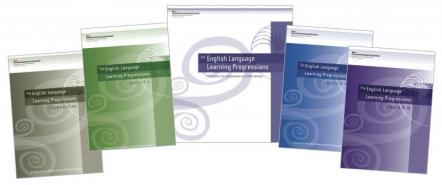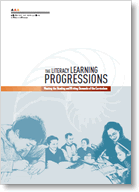You are here:
Implications for practice
The Ministry of Education publishes resources to support teachers of literacy at all levels and in all curriculum areas. The Literacy Learning Progressions align with the key resources.

The progressions are further explained in the professional learning materials provided online to support the reading and writing standards.
Knowing the demands
Teachers need to be aware of the challenges in the literacy demands across the curriculum. These challenges include the characteristics of texts themselves, the complexity of the tasks, and the match between each text and each student’s existing knowledge, lived experiences, and expertise. Further professional learning materials will be provided online to support the reading and writing standards and to support teachers in understanding the literacy demands in texts and tasks.
A note on the concept of "reading age"
The concept of “reading age” provides only a rough guide to the complexity of a text, and the term is not a valid way to describe a student’s level of reading expertise.
An analysis of student data by NZCER reveals that, at least by year 4, “year level is in fact a slightly better predictor of scale score than age” (Darr et al., 2008, page 14). The results showed that differences in chronological age made no significant difference to the results of PAT reading tests, despite an age difference in any one year group of up to eighteen months.
Enabling students to meet the demands
Teachers need to:
- understand the developmental process for the year groups they teach;
- be aware that learners construct meaning within social and cultural settings (including home and school settings);
- recognise the importance of making connections to students’ individual expertise and interests and building from there.
These concepts underlie the literacy learning model on which both Effective Literacy Practice in Years 1 to 4 and Effective Literacy Practice in Years 5 to 8 are based. For secondary school teachers, Effective Literacy Strategies in Years 9 to 13: A Guide for Teachers provides suggestions, based on the same model, to help develop students’ relevant literacy expertise in all subject areas.
Integrating an understanding of cultural identity
Literacy is a sociocultural practice. Students bring their lived experiences – their culture, language, and identity – with them into the classroom. Ka Hikitia and the Pasifika Education Plan emphasise the importance of building on these experiences. Ka Hikitia – Managing for Success: The Māori Education Strategy 2008–2012 focuses on “Māori enjoying education success as Māori” (page 18). The strategy emphasises ako as the basis for teaching and learning relationships in which educators also learn from students and in which teaching practice is deliberate, reflective, and informed by the latest research. Students are more likely to achieve when they see themselves and their culture reflected in curriculum subject matter in all learning contexts.
Effective teachers actively seek opportunities to build on the skills and experiences that their students bring to the classroom. They deliberately choose texts and tasks that reinforce each learner’s lived experience, so that each learner can integrate their own culture, language, and identity into their learning and achievement.
Developing English language learners’ literacy expertise
Reading and writing English-language texts presents particular challenges for students who are learning English as an additional language. All teachers need to be aware of these challenges and able to identify the differing language learning needs of these students.
English language learners in New Zealand schools have very diverse language learning needs. Students with minimal English will have obvious needs, while other English language learners may have good social English language but may lack proficiency in the academic English that is needed to access the curriculum. (However, teachers need to be aware that all students, not just those who are learning English, will need specific instruction in academic English.)
The English Language Learning Progressions sets out the important things that primary and secondary school teachers need to know about literacy learning in English for students who are learning English as an additional language.



